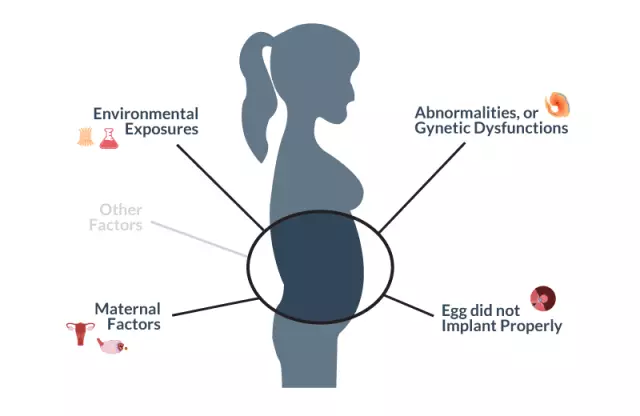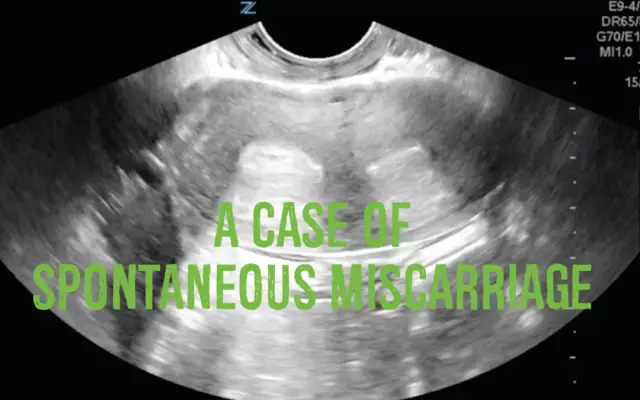- Author Rachel Wainwright wainwright@abchealthonline.com.
- Public 2023-12-15 07:39.
- Last modified 2025-11-02 20:14.
Late miscarriage
To date, late miscarriage is not an abnormal occurrence for obstetricians and gynecologists. In most cases, the expectant mother, learning about such a development of pregnancy, falls into depression and loses hope that she will ever be able to have a child.

Don't despair. The main thing is to promptly seek help from specialists who will always help you find a way out of this situation and save the baby's life.
What is a miscarriage? In medical practice, it is generally accepted that this is an untimely termination of pregnancy, which occurs naturally, without outside help. There are two types of miscarriage: early (before 8 weeks of pregnancy) and late miscarriage (if the period exceeds 12 weeks).
In the case when a miscarriage occurs at the 5th month of pregnancy, it is considered to be premature birth. Nowadays, almost 20% of all women in a position do not wait for the birth of a baby and end the gestation process with an untimely termination of pregnancy. In most cases, this happens when the expectant mother herself does not yet know that she is pregnant. If parents really want to have a child and are putting a lot of effort into it, you can be sure that the problem of miscarriage in the second trimester will bypass you.
Causes of late miscarriage
As medical practice shows, there are a lot of reasons for miscarriage in the second trimester. In more than 70% of cases, it occurs due to genetic failures in the development of the fetus, which are associated not with heredity, but with the influence of the environment. Among the remaining reasons, the characteristics of the female body prevail, as well as the lifestyle that a particular woman leads.
In order to reassure expectant mothers at least a little, we note that when a woman's pregnancy exceeds 12 weeks, the likelihood of a miscarriage is significantly reduced. According to statistics, late miscarriage is observed in 25% of all miscarriages that occur annually in our country. If unaided abortion occurs after 22 weeks, it is premature birth. Children born during this period are considered premature and in most cases survive thanks to modern medical advances.
When it comes to miscarriage in the second trimester, then among its possible causes, possible disruptions in the development of the unborn baby are not even considered. Among the factors affecting miscarriage during this period are noted:
- Inflammatory processes of the walls of the uterus or areas of the placenta.
- Untimely exfoliation of the placenta.
- Various infections.
- Operations that were previously performed on the uterus or vessels.
- Quite frequent mental disorders, leading to severe depression and depression.
Don't lose hope after a miscarriage
Often, women who have experienced a late miscarriage are desperate and do not believe that they will be able to become pregnant at least once and bear a full-fledged child. In fact, you can get pregnant, but you should know that after such a phenomenon, the cervix will become much weaker than before. This is due to the fact that the cervical tissue is too hard, as a result of which it is possible to temporarily close the canal, while the fetus is successfully growing and increasing the volume of the uterus. After 8 weeks of pregnancy in expectant mothers with a weak cervix, the canal gradually expands, which should not be the case with normal pregnancy.
Unwanted late miscarriage very often entails rupture of the fetal bladder (due to the weakness of the cervical canal) and, as a result, the leakage of amniotic fluid. To prevent this, the obstetrician-gynecologist is obliged to bandage the cervix in a special way in a timely manner. After 33 weeks of pregnancy, this sling is removed. It is thanks to this kind of surgical intervention that a large proportion of women eventually give birth to full-fledged and healthy children. Other (milder) consequences of late miscarriage are also known, which do not require the help of surgeons and are limited to short-term therapy.
Breast after miscarriage
It is not uncommon for the breast to release milk after a miscarriage (most often this occurs in late pregnancy). In the event that a miscarriage was observed before the 14th week of pregnancy, milk will not be produced in the breast. It is rather difficult to understand the nature of this phenomenon, since not a single woman in the world can know in advance how the hormones responsible for filling the breast with milk will behave. There are cases when expectant mothers excreted colostrum even when they were just thinking about a possible miscarriage.
Breasts after miscarriage can behave differently. If you want to stop milk production in it, do not pump and wear a tight bra all day long. In order to suppress discomfort in the chest, you can take a warm shower, apply cabbage leaves and cool compresses to the mammary glands. If the pain of suppressing breast milk becomes unbearable, try pumping a little, reducing the volume of expressed milk each time.
You can also prevent the production of breast milk by using special medicines, which should be purchased only after prior consultation with your gynecologist. When your breasts are in severe pain, and you notice redness or large lumps, see your doctor immediately.
Prevention of late miscarriage
Unfortunately, it is not always possible to avoid late miscarriage, since its cause lies in the abnormal development of the fetus itself. However, in order to bring the pregnancy to its last week and at the same time preserve your health and the life of your baby, you should follow some tips:
- Try to be optimistic and drive away a bad mood, which most often leads to stressful situations that have a detrimental effect on bearing the fetus;
- Give up harmful food, remembering that only healthy food will enrich the child with all useful vitamins and minerals;
- Forget about cigarettes and alcohol;
-
Do not eat for two, so as not to get too fat in the last months of pregnancy;

Stress is a possible cause of a second trimester miscarriage - Do morning exercises that include exercises for expectant mothers.
Recovery from late miscarriage
Many parents dreaming of a child will try to conceive again even after a miscarriage. However, in order to more easily survive the current stressful situation and achieve a positive development of events for the second time, follow a few tips and recommendations of specialists:
- Immediately after a late miscarriage, do not rush to conceive a child again, since a weakened female body will not be able to bear it until 9 months;
- If you have postponed the next conception for a while, skillfully approach the choice of contraceptives (for this it is best to ask the doctor for help);
- To prevent recurrent miscarriage, talk to your gynecologist about the possible causes of this phenomenon.
Having experienced a late miscarriage, do not lose hope and remember that many women, even after 4 such cases, manage to give birth to a healthy and long-awaited baby.
Found a mistake in the text? Select it and press Ctrl + Enter.






